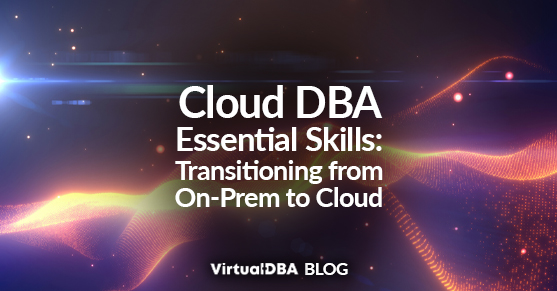Cloud DBAs, welcome to the cloud era! The digital landscape is undergoing a seismic shift. Businesses are rapidly migrating their operations to the cloud, with database systems at the heart of this transformation. For Database Administrators (DBAs), this presents both challenges and opportunities. The traditional on-premise DBA role is evolving, demanding a new skill set to manage databases effectively in the cloud environment.
This blog delves into the essential skills DBAs need to thrive in the cloud era. We will explore the core DBA skillset, the additional cloud-specific knowledge required, and the ever-important soft skills contributing to a DBA’s success.
Core DBA Skills: A Solid Foundation
Before diving into the cloud, a strong foundation in traditional DBA practices is crucial. Here are the core competencies that every cloud DBA should possess:
- SQL Expertise: Structured Query Language (SQL) is the fundamental tool for interacting with relational databases. DBAs must be proficient in writing, understanding, and tuning complex queries.
- Database Administration Fundamentals: A solid grasp of DBA principles is essential. This includes schema design, backup and recovery procedures, user management, performance tuning, and security best practices.
- Database Troubleshooting: The ability to diagnose and troubleshoot database issues is critical. DBAs must identify performance bottlenecks, resolve errors, and ensure database uptime.
Cloud-Specific Skills: Taking Flight
The cloud introduces a new dimension to database management. To excel as a Cloud DBA, one must build upon their core skills and acquire the following cloud-specific knowledge:
- Cloud Platform Expertise: Familiarity with leading cloud platforms such as Amazon Web Services (AWS), Microsoft Azure, and Google Cloud Platform (GCP) is essential. Understanding their database offerings, such as AWS RDS, Azure SQL Database, and GCP Cloud SQL, is crucial for effective management.
- Cloud Migration and Management: The ability to plan and execute database migrations to the cloud is a valuable skill. This involves understanding migration strategies, tools, and best practices to ensure a smooth transition. Additionally, managing databases in the cloud requires familiarity with cloud-based provisioning, monitoring, and scaling techniques.
- Infrastructure as a Service (IaaS), Platform as a Service (PaaS), and Database as a Service (DBaaS): Understanding the different cloud service models (IaaS, PaaS, and DBaaS) and their implications for database management is crucial. Cloud DBAs must determine the most appropriate service model for their specific needs, considering cost, control, and flexibility.
- Security in the Cloud: Data security is paramount in the cloud. Cloud DBAs need a strong understanding of cloud security best practices, including access controls, encryption, and auditing. They should be well-versed in the security features offered by their chosen cloud platform and how to leverage them effectively.
- Cost Optimization: Cloud resources are billed based on usage. Cloud DBAs are crucial in optimizing costs by right-sizing resources, utilizing auto-scaling features, and identifying opportunities to leverage managed services.
Advanced Skills and Trends: Staying Ahead
To provide more depth, DBAs should consider including advanced skills and current trends in cloud database management:
- Automation and Scripting: Proficiency in automation tools and scripting languages (e.g., Python, PowerShell) is essential for streamlining repetitive tasks such as backups, patching, and monitoring.
- AI and Machine Learning Integration: Understanding how to leverage AI and machine learning for database management can significantly enhance performance tuning, anomaly detection, and predictive maintenance.
- In-Memory and All-Flash Databases: Knowledge of in-memory databases (e.g., Redis) and all-flash storage solutions can help DBAs manage high-performance, low-latency applications.
- Multi-Cloud and Hybrid Cloud Strategies: Familiarity with multi-cloud and hybrid cloud environments allows DBAs to design resilient, flexible database architectures that can leverage the strengths of multiple cloud providers.
- Graph Databases and NoSQL: As data relationships become more complex, understanding graph databases (e.g., Neo4j) and NoSQL databases (e.g., MongoDB) is increasingly important for managing connected data.
Soft Skills: The Power of Communication and Collaboration
Beyond technical expertise, soft skills are often the secret sauce for success in any technical role. As DBAs transition to the cloud, these skills become even more critical:
- Communication: Effective communication skills are crucial for collaborating with developers, application owners, and other stakeholders. Cloud DBAs need to clearly articulate technical concepts and explain the impact of database decisions on the broader business objectives.
- Problem Solving: The ability to think critically and solve problems efficiently is essential. Cloud DBAs will encounter unforeseen challenges, and strong problem-solving skills are critical to navigate these situations effectively.
- Adaptability and Continuous Learning: The cloud landscape is constantly evolving. Cloud DBAs need to be adaptable and embrace a continuous learning mindset. Staying current with the latest cloud technologies and best practices is critical for maintaining their competitive edge.
Putting it All Together: The Successful Cloud DBA
A successful cloud DBA is a well-rounded individual with a strong blend of technical skills, cloud expertise, and soft skills. The ideal candidate possesses a deep understanding of traditional DBA practices while being adept at navigating the complexities of the cloud environment.
Here are some additional tips for aspiring cloud DBAs:
- Pursue Cloud Certifications: Earning cloud certifications from major cloud providers like AWS, Azure, and GCP demonstrates your proficiency in their respective cloud platforms and database offerings.
- Build a Cloud Lab Environment: Setting up a personal cloud lab allows you to experiment, practice cloud database management techniques, and gain valuable hands-on experience.
- Stay Connected with the Cloud Community: Actively participate in cloud communities, forums, and meetups to stay informed about the latest trends and best practices.
For more information, please contact us! Be sure to check out our Remote DBA Support and Cloud Managed Services.

